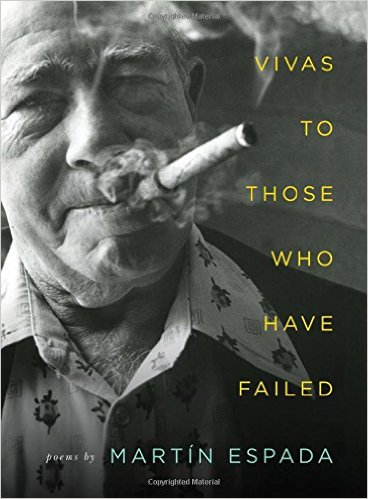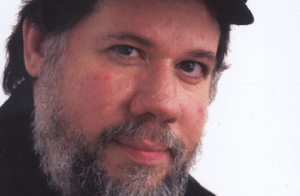Writers Read: Vivas to Those Who Have Failed by Martín Espada
 Martín Espada, where have you been all of my life? I believe that the universe sends artists, writers and poets gifts of inspiration when they truly need it. Espada is a Latino poet, like me, born in America, who has the eloquence of Walt Whitman and the passionate pulsating spirit of Charles Bukowski. Espada’s poetry is timeless; at once modern and classic, his poems are sprinkled with pop culture references, even while honoring his poetic heroes like Walt Whitman.
Martín Espada, where have you been all of my life? I believe that the universe sends artists, writers and poets gifts of inspiration when they truly need it. Espada is a Latino poet, like me, born in America, who has the eloquence of Walt Whitman and the passionate pulsating spirit of Charles Bukowski. Espada’s poetry is timeless; at once modern and classic, his poems are sprinkled with pop culture references, even while honoring his poetic heroes like Walt Whitman.
I immediately connected with Espada because of his opening lines. I’ve been taught that poetry needs no prologue, to just dive in and bring the reader into your poems, but Espada doesn’t just follow this, he is the master of this poetic school of thought with opening lines like “Now the bells speak with their tongues of bronze” from “Heal The Cracks in the Bell of the World.” The reader is enthralled and mesmerized by that opening image. She is locked in and ready to follow Espada through his ode to those lost at Sandy Hook. It’s difficult to illuminate a sense of beauty from such a horrible tragedy, but Espada does this brilliantly with his reflection echoes the resounding of the bell.
Espada’s ode to the boxer Jose “Chegüi” Torres in “A Million Ants Swarming Through His Body” is a poem that Bukowski would love. Beginning with “There is no storyteller like a storyteller with a broken nose,” Espada captures his audience’s attention with the most vivid concrete images that connect visually and lyrically in his opening lines. When Espada writes, “Chegüi would jab my chest before he told the tale, and I would listen,” he is playfully poking the reader, and Espada has all of our attention. He takes on a lyrical poetic journey in this boxer’s life by reprising the title and the opening lines over and over again. Espada used the repetition in this case to simulate a boxer getting punched, and it’s so effective: the reader can feel the sweat, the blood and agony oozing from this triumphant ode. Bukowski would love the climax of the poem when Espada writes:
“[…] champion of the worlds and Spanish Harlem, savior of the janitors
dishwashers, poets, as it does for all champions and saviors,
as it does for all us in the happy crowd, singing and punching in the air.”
The last part of the poem perfectly connects with the crowd, feeling like they are also in the ring, fighting with the champion. Quiet, yet powerfully beautiful.
My favorite poem in Vivas is the one Espada wrote for his father Frank Espada, called “El Moriviví.” Like the boxer poem, this one, even more personal, completes Vivas. There are so many lines that capture the spirit of Espada’s life, like:
“My father spoke in the tongue of el moriviví, teaching me
the parable of Joe Fleming, who screwed his lit cigarette
into the arms of the spics he caught, flapping like a fish.”
These are lines that the reader can see, smell, taste and fear; they immediately give his audience a visual connection that sparks them to continue reading. And so many more lines like, “My mother would tell me: Your father is out dodging bullets […] at 4 AM every time I swore he was gone for good.” Espada describes his father’s life using metaphorical shades of mystical Greek or Roman godlike figure with lines like, “My father knew the secrets of el moriviví, that he would die/then live.” The repetition of living and dying is resurrected throughout “El Moriviví”, climaxing in the most poignant ending:
them to continue reading. And so many more lines like, “My mother would tell me: Your father is out dodging bullets […] at 4 AM every time I swore he was gone for good.” Espada describes his father’s life using metaphorical shades of mystical Greek or Roman godlike figure with lines like, “My father knew the secrets of el moriviví, that he would die/then live.” The repetition of living and dying is resurrected throughout “El Moriviví”, climaxing in the most poignant ending:
“[…] the grainy shadows and the light, but could never see: my father
was a moriviví. I died. I lived. He died. He lived. He dies. He Lives.”
Espada explained the title to Democracy Now when he said,” Yeah, in Latin, it’s the Mimosa pudica. It’s a pantropical weed. It shrinks from contact. And it also closes in the dark, and it opens in light. And so it became the ideal metaphor, for me, for the many lives, deaths and rebirths of Frank Espada, who has died and now he’s back.”
Samuel Beckett once wrote, “Ever tried. Ever failed. No matter. Try Again. Fail again. Fail better.” No one has ever succeeded in honoring those who have failed, struggled and/or passed away better than Martín Espada. Vivas is a tribute to those spirits who have died, like his father, and are now immortalized, forever alive in this inspiring collection for all to embrace.
Espada, Martín. Vivas to Those Who Have Failed. New York: W.W. Norton. 2016. Print.





